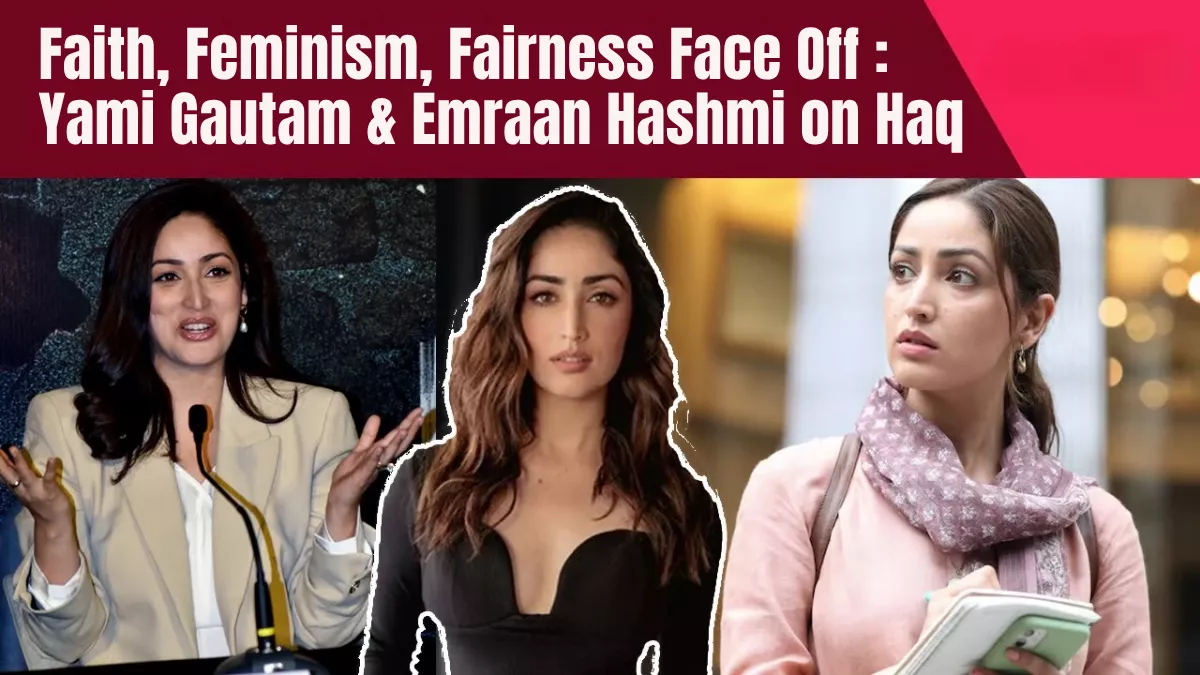
Yami Gautam and Emraan Hashmi in Haq, a film exploring faith, feminism, and fairness. | Image: PuneriPages.in
By Prashant for PuneriPages.in
The upcoming courtroom drama Haq, starring Yami Gautam and Emraan Hashmi, dives head-on into complex themes of faith, feminism, and fairness. In their candid conversation with NDTV, the two actors reveal how the film, inspired by the landmark Mohd. Ahmed Khan v. Shah Bano Begum case of 1985, tackles sensitive questions with balance and intent.
Table of Contents
Understanding the Film’s Groundwork: Faith, Feminism & Fairness
Haq is pitched as a courtroom drama that addresses the intersection of law and religion through the lens of a Muslim woman’s fight for justice. Yami Gautam plays the lead role, loosely based on the historical figure whose case re-defined the discourse around triple talaq and women’s rights in India. Emraan Hashmi plays the opposite role. The film’s makers and cast emphasize that the film is “completely neutral and balanced” in its portrayal of all sides.
The film explores three major pillars:
- Faith – How religion and personal beliefs intersect with law and rights.
- Feminism – A woman’s agency in a system historically skewed against her.
- Fairness – The idea that the legal system must protect all, regardless of religion or gender.
Yami highlights how her character breaks every stereotype—from being a victim to becoming an active claimant of her rights. Emraan shares that his role required him to introspect deeply, not just as an actor but as a citizen observing social fault-lines.
Yami Gautam on Her Role: A Voice for Change
Yami entered the conversation with a quiet intensity, saying that playing Shazia Bano (the fictional counterpart) was more than an acting assignment—it was a commitment to representation. She remarks that the film pushes the idea that women of all faiths deserve fairness—and that feminism isn’t alien to religious identities.
For Gautam, the film becomes a bridge between two worlds: the traditional and the modern. She emphasizes that embracing one’s faith need not exclude standing up for one’s rights. The film’s narrative gives her character a dual identity—rooted and free—a concept she says is “long overdue” in Indian cinema.
Emraan Hashmi on His Role: Complexity and Contrast
Emraan describes his character as “neither wholly correct nor wholly flawed.” He shares that playing such a role demanded moral ambiguity—more courtroom latitude, less Bollywood melodrama. He wanted viewers to ask questions rather than lean on easy answers.
In the NDTV interview, he appeals to Muslim audiences to watch the film with open minds, believing it will resonate across communities. He says the film’s neutrality and realism are deliberate—designed to open dialogues rather than deepen divides.
The Landmark Case and Its Cinematic Return
The 1985 Shah Bano case was a watershed moment in Indian jurisprudence. It tested civil rights, personal laws, and the nature of justice. Haq revives that spirit, not by dramatizing every courtroom sequence, but by highlighting the human story behind the verdict: trauma, hope, transformation.
The film does not recreate the case verbatim but uses it as a launching pad—showing how one fight reverberates across decades and communities. Yami notes that their research included conversations with legal scholars, while Emraan mentions that they probed judicial archives and personal testimonies to capture the gravity of the subject.
Balancing Sensitivity and Storytelling
Yami and Emraan both acknowledge the difficulty of handling sensitive material—religion, gender, law. Yami says the team constantly asked: “Are we fair to every side?” Emraan confirms that his role involved imagining multiple perspectives.
The makers took care to ensure the narrative remains inclusive, with no side demonised or glorified. Emraan’s appeal for Muslim audience engagement reflects this open stance—they are not targeted or sidelined but invited into conversation.
Additionally, the film has faced legal challenge: the daughter of Shah Bano issued notice claiming the film draws too heavily from her mother’s personal life. The dispute highlights the tension between artistic adaptation and real-life inspiration.
Performance, Promotion & Public Expectation
In the lead-up to its release, Haq’s trailer, character posters and interviews have generated substantial buzz. The pairing of Yami and Emraan—both bracketing commercial and critical genres—has added weight. Fans and critics expect the film to push boundaries—not only in subject matter but in storytelling style.
Yami’s calm presence and Emraan’s intensity seem designed to complement each other: empathy meets gravitas. Media coverage portrays the film as socially relevant and commercially viable—an appealing combination. As watchers, we anticipate a film that is compelling, conscientious and cinematic.
What this Means for Indian Cinema
Haq is more than a movie—it’s a statement. It suggests that mainstream Indian cinema can tackle weighty social issues without sacrificing entertainment. Faith-based characters, feminism, and legal themes seldom co-habit in big-budget releases, but this film aims to change that.
Its success could pave the way for more films that are socially aware yet widely accessible—films that treat identity, rights and narrative fairness as integral to the story rather than mere subplot.
Final Word
When Yami Gautam and Emraan Hashmi speak to NDTV about Haq, we hear a film that aspires to do more than entertain—it intends to engage, provoke and inspire. It stands at the intersection of faith, feminism and fairness, asking us to watch more than the screen—to look inward, question norms, and imagine justice in lived terms.
For movie-goers, this means preparing for an experience that is cinematic in scale, meaningful in message, and resonant in emotion. Haq might not give all the answers—but it promises to ask the right questions.